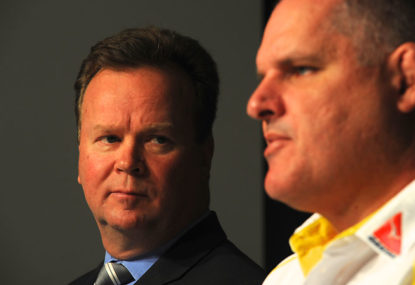No doubt many Roarers would be relieved and delighted I don’t run SANZAR, or for that matter, Australian rugby.
I’m inclined to look at the world a little differently. For me, long-term, slow and steady, sustained growth is always preferable to short-term, short-sighted, profit-driven spikes.
The ‘boom-bust-boom-bust-boom’ cycle is not healthy for any sport over a long period of time.
The news that Super Rugby is looking to expand into Asia, with perhaps a team based in either Tokyo, Hong Kong or even Singapore, doesn’t excite me at all.
If I was running SANZAR, I would actually be reducing the Super Rugby component, not expanding it.
Super Rugby is something that should bring together the leading teams from each of the national domestic comps of Australia, New Zealand, South Africa and Argentina, to determine a Southern Hemisphere provincial or club champion.
It should be no more than a 12-team comp (top three annually from each of those four countries). Condensed and completed in the shortest practical time.
It would be icing on the cake for fans from all four countries, watching their teams progress to Super Rugby playoffs after a (hopefully) vibrant domestic season.
It is said that charity begins at home. Your own home.
Why treat strangers with kindness while mistreating or ignoring your own family?
Why does the Australian government send millions, nay billions of dollars of aid overseas, while ignoring the destitute and needy within their own country?
When everyone else havs given up on you, or forgotten you, it is usually your own family that will stand by you and nurture you.
While it’s fun to have the ability to watch teams and players from overseas, Australians crave watching their own players and teams in a domestic comp.
Australian football has its own national comp, the AFL.
Sure, Aussie rules followers would love their game to be more wordly, more international, but heck, they have the best domestic comp in the land.
So what do they care if the game is played almost exclusively within our national borders?
Rugby league also has its own national comp, the NRL.
Again, Aussie league followers probably wish their game was also more worldly, more international, but heck, they have a comp rivalling AFL, so what do they care?
And rugby league also has State of Origin.
Association football (soccer) does enjoy the luxury of being the “world game.” But football administrators realised the importance of having a national domestic comp.
Which is why we now have the A-League. Despite its teething problems, it is building slowly but inexorably towards presenting a genuine long-term challenge to both AFL and NRL.
ARU chief excutive Bill Pulver realises the importance of domestic content. Which is why he is pushing for the NRC.
Sadly, it is my fear that this great concept will be scuppered by a totally inappropriate and impractical self-centered and self-serving arrangement of teams, especially from Sydney.
But we shall wait and see.
Nevertheless, the penny has dropped with the ‘powers that be’ running Australian rugby that while it is all well and good to expand the game overseas, having a significant domestic footprint is important.
Nay, make that critical.
Meanwhile, Super Rugby has grown from 12 teams in 1996 to 15 teams in 2014. The word is that SANZAR is looking to expand to 18 teams by 2016.
The Australian component has grown from three teams in 1996 to five in 2014. Super Rugby has been good for Australian rugby, giving it its own pseudo national comp.
But apart from the rusted-on diehards, the game has struggled to make significant inroads into mainstream sporting fans.
Part of the problem is that Super Rugby is only one-third Australian, in terms of players and teams. If the number of teams increases to 18, then Australia’s composition will fall below 30 percent.
While “globalisation” may be a hip word today, it’s evident that fans still want to see teams from their own country, with mostly players from their own country, belting into each other.
Being able to watch players and teams from other comps in other countries, is icing on the cake. But fans still crave their own domestic product.
John O’Neill’s legacy as a great sports administrator is being trashed yearly, perhaps even monthly.
O’Neill was Australian rugby’s first chief executive in the professional era. He precided over our most successful Wallabies period ever during 1998-2002.
However, it’s now quite evident it was the uber-talented Wallabies and not O’Neill who brought Australian rugby its greatest period of prosperity.
Furthermore, O’Neill’s mantra of ‘top-down’ approach, of keeping the Wallabies strong, at the expense of grassroots development, has been seen to be a massive failure.
Where on earth did the ARU think future Wallaby champions would come from, if not from their own juniors?
Anyway, here we are in 2014 with a rugby code potentially on its knees in Australia, while also experiencing considerable financial stress in South Africa and New Zealand.
Instead of concentrating the gains made in each of these countries, there is talk of ever-increasing the number of Super Rugby teams by expanding into Argentina (absolutely necessary) and Asia (unnecessary).
With Asia, the travel component is increased significantly. Plus, where will the players come from?
Like a helium balloon let off into the atmosphere, ever upward it will travel until it eventually disintergrates. That’s the fate awaiting Super Rugby if it is not careful.
The structures of the game need overhauling, not only in Australia but also across the Southern Hemisphere.
Former Wallaby player and coach Dave Brockhoff was fond of saying, “Don’t water the whiskey.”
It’s time for SANZAR, as well as Australian rugby, to consolidate.





























































































